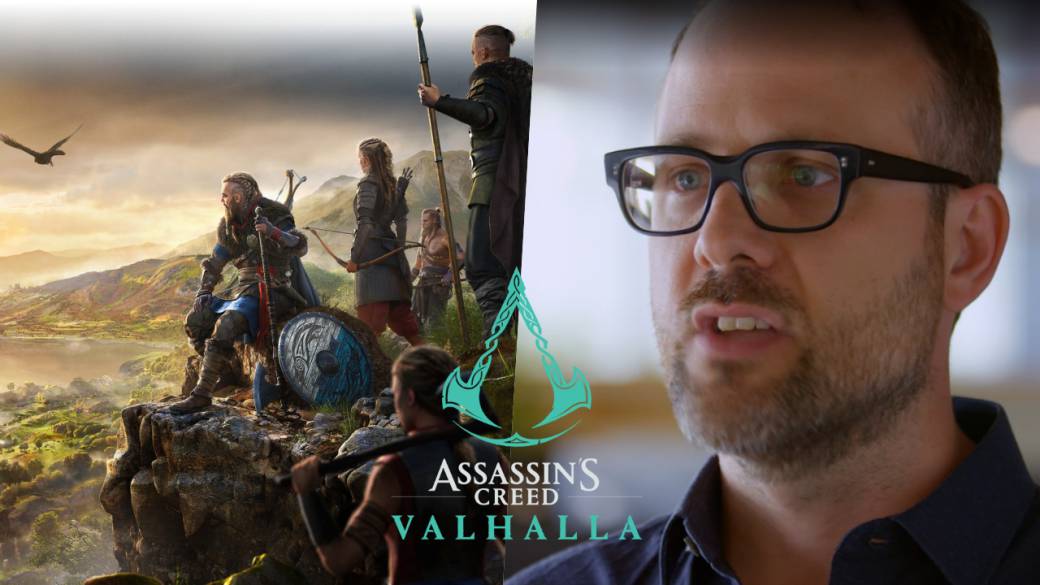
We interview Julien Laferriere, producer of the new Ubisoft Montreal production, who talks about the video game in depth.
Every formula has an expiration date, a time when the mechanics feel repetitive and it is necessary to address profound changes to revitalize it. After Assassin’s Creed Syndicate, Ubisoft’s successful license required a rethinking of ideas, and so Origins emerged. With Odyssey, the next installment, the Quebec studios managed to refine the previous work, but there were many who raised their voices to complain that the work had lost bits of the essence of the classics. Montreal was aware that a part of the community was not satisfied with the direction of the series, so Assassin’s Creed Valhalla tries to recover elements of the past so that both formulas converge. “You will see that the title is closely connected with the lore,” says Julien Laferriere, producer of the video game, in an interview with FreeGameTips.
“We have very enthusiastic fans and we take feedback from the community very seriously,” he stresses. “I have read comments from fans saying that it is no longer Assassin’s Creed. That is one of the reasons why we wanted to recover the social secrecy, the hidden leaf and other iconic elements of the saga ”. And that is why they have given a prominent role to lore. “We are building on the foundations of previous titles, so we try to make it consistent game by game.” According to his words, he hopes that players will find endless references to previous products. “They will feel rewarded and discover that they can play mixed with the crowd”, although those who prefer to approach the adventure from the point of view of the action will also be able to do so without problem.
We are building on the foundations of previous titles.
Vikings, deception and social stealth
In Viking fantasy, the great protagonists of this chapter are always portrayed as violent warriors, something that also happens in Assassin’s Creed Valhalla. However, at Ubisoft they want to capture a different facet. They did not always solve conflicts with the hatchet, tricks and diplomacy were valid tools. “In fact, Loki was the god of deception,” so they sometimes proceeded that way. “Social secrecy was designed taking into account how you evolve within the country, in a context in which people are hostile towards you. The hood and the masses become a tool, so that you are not easily recognizable.
Thus, the players can blend in with the population, pretend they are working as a blacksmith or sit on a bench in order to go unnoticed. Eliminating an enemy with the hidden blade and “hiding the corpse” is a plausible option. Cities are an unbeatable place to put all these skills into practice, “because there are so many people roaming and working.” And yes, the monks of the first chapters are back.
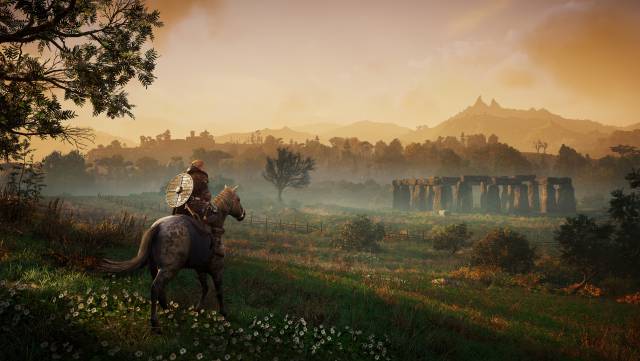
“There is a constant confrontation between Assassins and Templars, although at that time they were not called that, as they were still known as The Hidden Ones and the Order of the Ancients.” After two titles set in the classical world, the chronology advances a few centuries to the High Middle Ages. In the 9th century AD, Eivor and his clan of Viking warriors leave their native Norway in the midst of famine and war to seek a permanent settlement outside their frozen home. They land on British shores as invaders, but soon win the favor of some nobles, who forge alliances in a highly unstable and belligerent political climate. Laferriere regards this time as “an incredible opportunity” to play with the traditional elements of the saga: “We are approaching the crusades, where the two orders were born” as “we originally knew them”.
Political intrigues were the daily bread, and at the same time, “Christianity did not stop growing, it was devouring paganism.” According to the producer, the struggle between chaos and order is “very fertile ground for an Assassin’s Creed story”, in which the player “is at the heart of this conflict.”
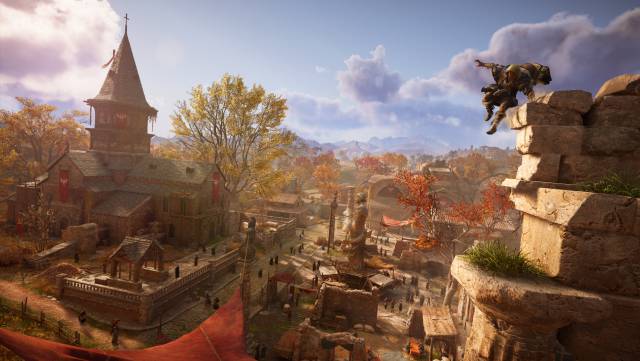
Hoods and masses become a tool for stealth.
The tone and structure of the missions
During the preview session, in which we were able to play for about 6 hours, we got the impression that the world was darker than that of Assassin’s Creed Origins and Odyssey, something that in a way fits the setting, despite Laferriere’s claim a slightly different point of view. “I wouldn’t say that the tone is necessarily dark, even when the theme is conflict and duality,” he reflects.
“We set out to tell a story about the Nordics from a more personal point of view. It is the story of Eivor, that of a leader who yearns to reach Valhalla, a very selfish goal. But being a leader requires maintaining a disinterested posture ”. These two natures face each other in a conflict that nests inside the protagonist and that extends beyond his person, reflected in the contrast between Norway and England. “Norway is tough and difficult, but at the same time, it is beautiful and majestic.” As you progress through the main plot, “you see a lot of similarities.” After all, “Vikings were just people trying to settle down.” They mix beautiful settings and more contemplative moments with scenes much more brutal and gloomy.
The narrative structure has been modified and arranged in story arcs, which have been called sagas. What is striking is the goodbye of side missions as such. “We tried to eliminate as much as possible the feeling of running an errand list, the feeling that you spend most of your time doing content missions almost automatically.” He emphasizes that “it is more like an adventure”, and that “you will feel connected to the characters and the territory you are exploring.” World Events are the alternative they have found to sprinkle more organic experiences. “The same designers who worked on the main story had good ideas” and they brought them to the world. They are small missions that offer tonal variety in their contents: “Sometimes they are funny, other sad, happy or adorable”, Laferriere continues.
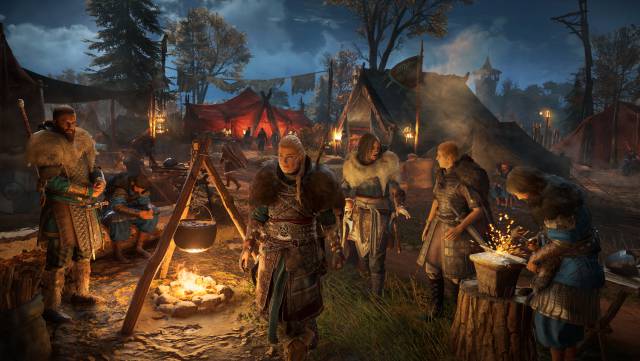
We try to eliminate as much as possible the feeling of running an errand list.
The mythology of the peoples in Assassin’s Creed
Telling a story about Egyptians, Greeks or Vikings, in this case, is an open window towards mythology, towards the possibility of mixing the lore of Assassin’s Creed with the beliefs of people of the past and present. “Their culture was closely tied to mythology,” he says, referring to the Vikings. “These people believed that the gods” were among them, that Odin spoke to them and that “their life purpose was to reach Valhalla.” To embrace that goal, it was necessary to die in battle with weapons in hand. “They had a fantastic sense of honor and destiny, so the methodical routine was deeply ingrained in their daily lives.”
This pagan mythology was in contrast to the Christian beliefs of the Anglo-Saxons. “The game takes place in a very dark period of history,” a time when some of the classical knowledge had been lost, the Dark Ages. “For example, London was rebuilt by the Saxons, but originally it was the Romans” who laid the first stones. The British “did not understand how they had been able to erect these huge structures, so they were told” that long ago “some giants built them.” The developers have tried to explore such beliefs to explain the sometimes irrational behavior of the characters.
Assassin’s Creed Valhalla will be released on November 10 on Xbox One, Xbox Series S, Xbox Series X, PC, and Google Stadia. On the 19th of that same month, it will be released on PlayStation 5. It is the time of the coronavirus, in which the studio has had to face new challenges. Julien Laferriere recalls how the transition came about: “When the Covid-19 crisis started, we allowed our employees to work from home, and now everyone is operational from there. The challenge was not in the technology, but in the fact that the team remained cohesive ”. Despite the challenges, the title has gone ahead and is already gold. The Vikings will be brandishing their tomahawks very soon.
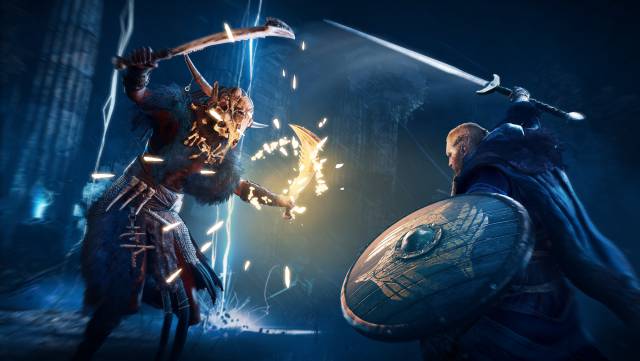
Their culture was closely linked to mythology, they believed that the gods walked among them.

